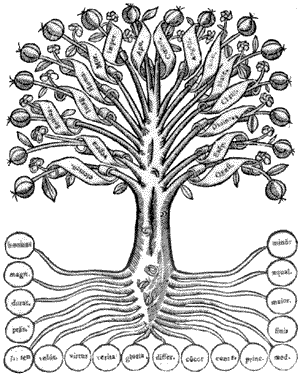ζῷον λόγον ἔχον, ζώον λόγον εχον, ζωον λόγον εχον, zoon logon echon, animal rationale, vivente dotado de linguagem
1. La definición del hombre como ζῷον Λόγον ἔχον, en el sentido de animal rationale. Ahora bien, el modo de ser del ζῷον es comprendido en este caso como estar-ahí y encontrarse delante. El Λόγος es un acondicionamiento superior, cuyo modo de ser queda tan oscuro como el del ente así compuesto1. (SZ:48; STRivera:70)
The human being is seen by the Greeks as ζώον λόγον εχον, not only philosophically but in concrete living: “a living thing that (as living) has language.” This definition should not be thought in biological, psychological, social-scientific, or any such terms. This determination lies before such distinctions. Ζωή is a concept of being; “life” refers to a mode of being, indeed a mode of being-in-a-world. A living thing is not simply at hand (vorhanden), but is in a world in that it has its world. An animal is not simply moving down the road, pushed along by some mechanism. It is in the world in the sense of having it. The being-in-the-world of the human being is determined in its ground through speaking. The fundamental mode of being in which the human being is in its world is in speaking with it, about it, of it. Thus is the human being determined precisely through the λόγος, and in this (GA:18-20) (15) way you can see where, if definition is a λόγος, the matter of definition has its ground insofar as λόγος is the basic determination of the being of the human being. The λόγος as ορισμός addresses beings in their ούσία, in their being-there. Therefore, we must gain an understanding of ούσία. (GA18:18; GA18MT:14-15)
Aristotle touches on this in a context where he wants to establish that the human being is a ζῷον πολιτικόν. In this context, he has recourse to the being of animals, and posits the ζῷον λόγον ἔχον as compared with a ζῷον that has only φωνή. He endeavors to show that life is already constituted through φωνή; that, furthermore, what is living in this way has a being that is fundamentally determined as being-with-one-another; and that animals are already, in a certain way, ζῷα πολιτικά. Human beings are only μάλλον ζῷον πολιτικόν than are (e.g., bees). (Pol. Α 2, 1253 a 10) By virtue of this demarcation from the being of animals, constituted through φωνή, the peculiar way of being that is determined by λόγος will become more precisely characterized. (GA18:50; GA18MT:36)
VIDE: zoon logon echon
NT:The phrase ζῳ̑ον λóγον ἔχον is traditionally translated as ‘rational animal’, on the assumption that λóγος refers to the faculty of reason. Heidegger, however, points out that λóγος is derived from the same root as the verb λέγειν (’to talk’, ‘to hold discourse’); he identifies this in turn with νοει̑ν (to cognize’, ‘to be aware of’, ‘to know), and calls attention to the fact that the same stem is found in the adjective διαλεκτικóς (’dialectical’). (See also H. 165 below.) He thus interprets λóγος as ‘Rede’, which we shall usually translate as ‘discourse’ or ‘talk’, depending on the context. See Section 7 b below ( H. 32 ff.) and Sections 34 and 35, where ‘Rede’ will be defined and distinguished both from ‘Sprache’ (’language’) and from ‘Gerede’ (’idle talk’) (H. 160 ff.). (BTMR)
O Da (das Da), o «aí» do Dasein é abertura ao ser, a Lichtung: «ele é a clareira.» (SZ:133)
Daí a primeira des-construção da definição de homem como zoon logon echon: tomar o homem, na sua essência, primeiro por um «vivente», é tomá-lo por vorhanden, por um dado aí-à-frente, é tê-lo por um ente subsistente e por um «processo» (Vorkommen) intra-mundano (Innerweltlich), é esquecer a sua «existência» (Existenz). Em suma, a analítica existencial (existenziale Analytik) descentra duplamente o homem, ao mesmo tempo em relação à questão do ser enquanto tal — embora apenas a título programático — e dá ao mundo a prioridade sobre o ser-que-é-meu (Jemeinigkeit). Esta prioridade do mundo, como este «no quê» em que o Dasein já está sempre, como horizonte incontornável das suas actividades possíveis, não será ela contudo de novo reposta em questão quando a análise, na Segunda secção do Ser e Tempo, que procura a condição de possibilidade da autenticidade (Eigentlichkeit), desabrocha no tema da temporalidade (Zeitlichkeit) ex-tática (Ekstase) de Si? (HEH:18)
«del ente así compuesto»: lo grave de la definición tradicional del hombre consiste en que esa definición presupone, según Heidegger, que el ser del hombre es, fundamentalmente, una Vorhandenheit, un estar-ahí-delante. Así, la definición de hombre oculta el modo de ser que es propio del hombre: su ex-sistencia.

